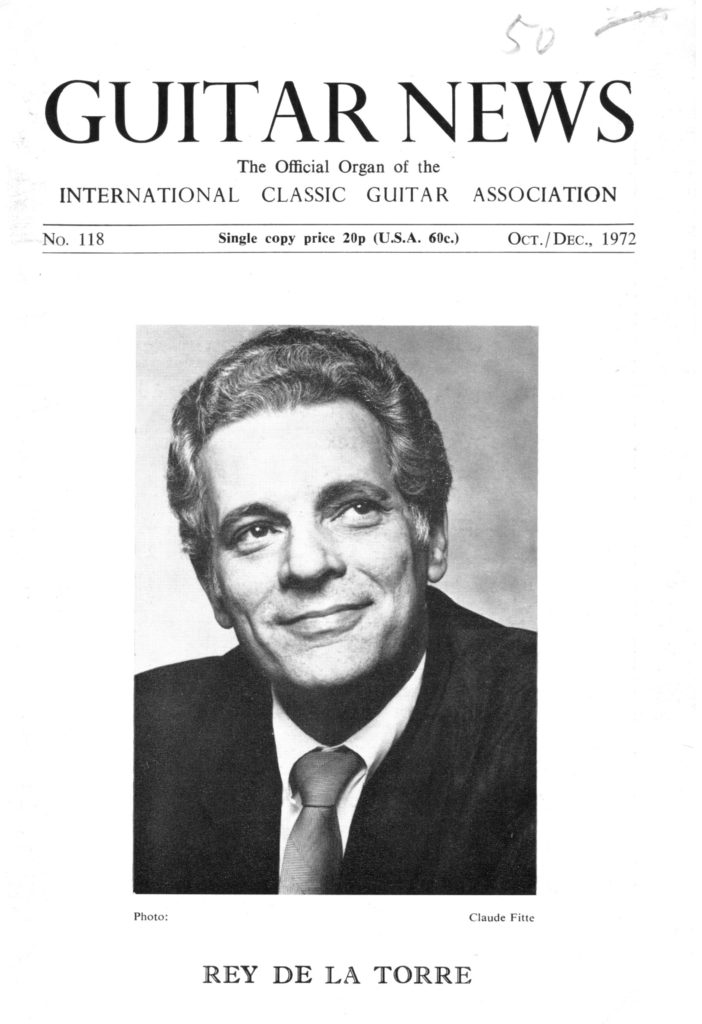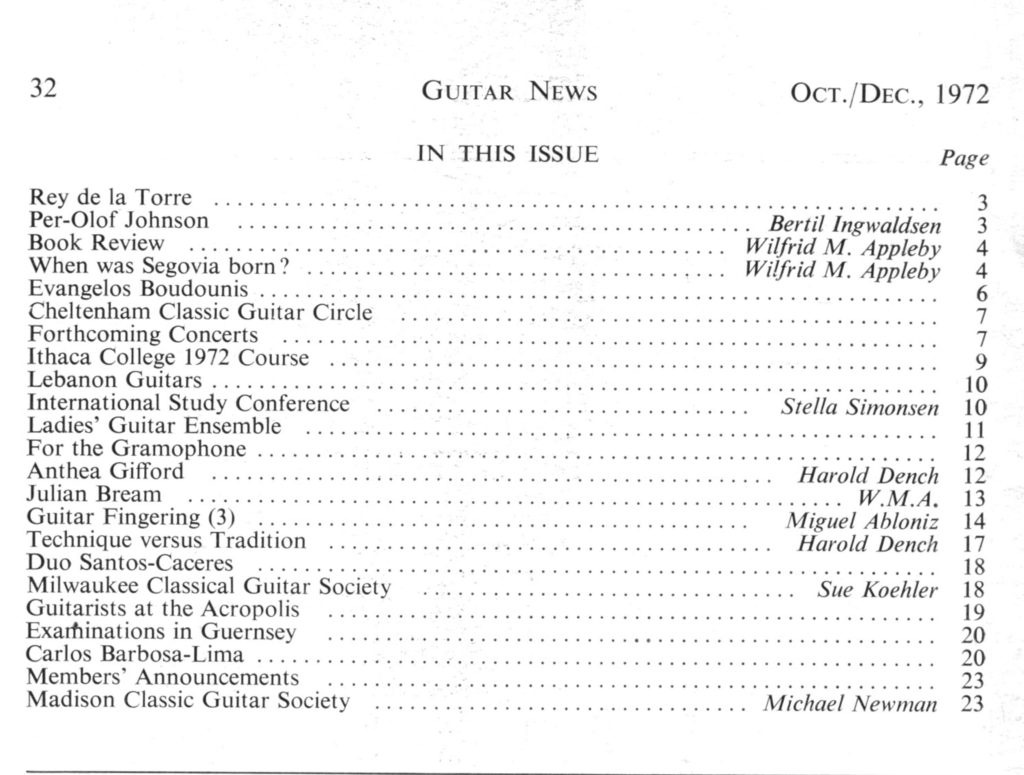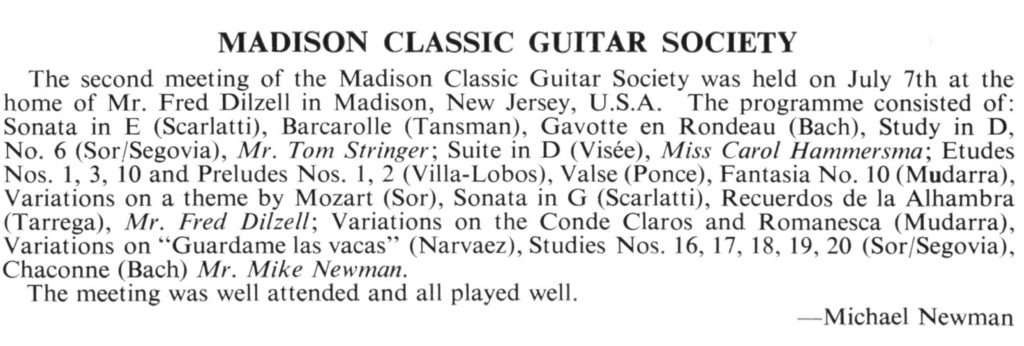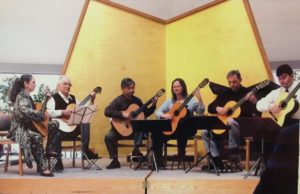Darren O’Neill contacted NJCGS recently to share some historical information about the Society that he had discovered. He also suggested that it would be very nice to have a “History of the Society” somewhere on our website. We do, in fact, have some historical coverage of Society history on the website: if you scroll down on the right-hand column on the home page (https://njguitarsociety.org/), you’ll come to a list of archived “Categories,” one of which is “History.” Some posts in other Categories, particularly “Obituaries” may also be of interest from a historical perspective.
At this point the information we have is limited and sketchy, but it might be, as Darren has suggested, developed into something that we could use in more prominent places on the website and elsewhere. If you have any information or documents that would further this objective, please share them with us. We’d love to hear any interesting stories or memories of your experiences with NJCCS that you might have. Our Society has been around for over fifty years, but we’re also interested in hearing from you about more recent times. Yesterday has a way of turning into long ago, given enough time. Below are some of Darren’s comments, images of documents he has found, note from David Starbuck, and some editorial comments:
“I was looking at a website – “Digital Guitar Archive” (digitalguitararchive.com) – when I discovered an announcement by Michael Newman of the second meeting of the Madison Classic Guitar Society. The announcement was printed in the October 1972 edition of the British journal, “Guitar News.” Attached are images of the cover, table of contents, and the published announcement:

I was surprised to learn that the earliest incarnation of the NJ Guitar Society was known as the Madison Classic Guitar Society.

I’m assuming that the name was given because of the meeting location at Fred Dilzell’s home in Madison. Michael Newman was 15 years old at the time. Also, interesting to see that Carol Hamersma was there: she couldn’t have been more than a teenager, too. Seems like the four performers had at least 30 minutes apiece to present. And some very meaty repertoire for teenagers to perform – wow!

I know that later in the decade (around 1979) the meetings moved to the New Providence area when George Schindler and Connie LeCraw became involved. Both worked for Bell Labs, and they had colleagues who regularly attended. I’m not sure if that’s when the name of the organization changed over to NJ Guitar Society. I became involved starting in 1993 when meetings were hosted at George’s home in New Providence. By the end of the 1990s, we alternated locations between George’s home and Fred’s home in Madison.” Darren O’Neill
I met Connie LeCraw when I was living at the Westfield YMCA in late 1980. I used to practice downstairs in the main lobby late night/early morning so as to not disturb other residents. Connie was trying to get a group of people together as far back as that time. Connie was working at Bell Labs in Murray Hill. He had quite a few accomplishments in his career there and published about a dozen technical papers with the IEEE. I was able to get in touch with him in 1986 when he mentioned they (he and George) were planning meetings at George Schinder’s house in New Providence. The first meeting I attended was early in 1987. Meetings were held there for a number of years until George moved to a senior housing in Berkeley Heights. We had meetings there from around 1993-94 until he moved again after his wife passed away, to the Princeton area. Meetings were held there until Bob Ey took over and had meetings in Hopewell. There were at least two concerts at the Madison Library. I played in one. A recording was made. Maybe someone has a copy. Mine is packed away and may take some time to find it. David Starbuck
Editor’s Note: It always has been my understanding that NJCGS originated with the Bell Labs group, so I reached out to Michael Newman for comment. We hope that Michael will share more of his memories and “ancient records” in future discussions of our history, but he responded that he “did always think of Madison as its own organization.” So the transition may have been more of a merger than a name change. Michael also mentioned a Princeton Guitar Society and a Flemington Guitar Society that were active in the 60’s and ‘70s.
As Darren notes, George Schindler and Fred Dilzell were holding meetings in New Providence and Madison, respectively, in late 1990’s. George extended the Society to the Princeton area when he relocated to Montgomery around 2000, I assume to be closer to his daughter, Heather. Montgomery is centered around Route 206 just north of Princeton. George continued to hold meetings in his apartment on Center Drive, which is a rather unusual location: apparently, most of Center Drive was absorbed by the Montgomery Shopping Center, leaving only a couple of apartment buildings in a short residential section northeast of the shopping center. There’s no other access to the street, so we had to go through the shopping center to get to George’s meetings.
In 2005, George decided that the time had come to pass the torch, so I agreed to host the Princeton area meetings in my home in Hopewell Borough, about seven miles west of Montgomery on Route 518. George continued to play at meetings until 2013. By 2006, David Starbuck was hosting meetings in Warren (Somerset County). Meetings mostly rotated among Madison, Hopewell, and Warren until 2011, when struggles with cancer forced Fred Dilzell to discontinue.

